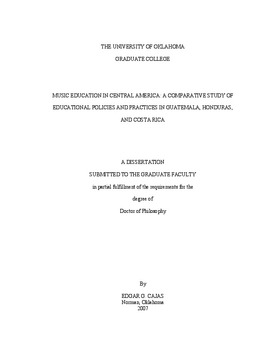| dc.contributor.advisor | Barry, Nancy, | en_US |
| dc.contributor.author | Cajas, Edgar G. | en_US |
| dc.date.accessioned | 2013-08-16T12:20:52Z | |
| dc.date.available | 2013-08-16T12:20:52Z | |
| dc.date.issued | 2007 | en_US |
| dc.identifier.uri | https://hdl.handle.net/11244/1238 | |
| dc.description.abstract | This study aimed to investigate how music is currently being taught, primarily at the elementary school level, in three countries---Guatemala, Honduras, and Costa Rica---where music education is included in the public education system. Relevant information, including music teachers' profiles, music curricula, methods, materials, organizations, current educational reforms, and the impact of these reforms on school music were collected in each country. The historical background of music education in the region was gathered. Also investigated were the nature and levels of governmental support for music education, music teacher training, the main hindrances to making music instruction available to all students, and successful initiatives for developing and promoting music education. | en_US |
| dc.description.abstract | In order to assemble data for this study, qualitative and quantitative research methods were employed. The qualitative phase included interviews with 20 key music educators, ministry of education officials, and music institution administrators. A survey administered to 365 music teachers in the three countries comprised the quantitative phase. | en_US |
| dc.description.abstract | Although several studies have been done on various aspects of music in Central America, the subject of music education in Central America has not been studied satisfactorily in either the English or Spanish languages. | en_US |
| dc.description.abstract | Results indicate that there is a great deficit of music teachers in the region and a lack of funds for basic materials and equipment. As one outcome of the most recent educational reforms in Guatemala and Honduras, music has been incorporated into broader areas of curricula, such as Artistic Expression. Music teacher training varies in each country, as does the governments' support, including the hiring of teachers for the elementary level. Music teacher profiles for the region were assembled from the information obtained in the surveys. | en_US |
| dc.description.abstract | Although surveys results cannot be used to make generalizations, they give a panoramic view of music teachers' views on music education issues such as the values of music in education, methodologies employed, working conditions, and self-perceptions of their own training. | en_US |
| dc.format.extent | x, 253 leaves : | en_US |
| dc.subject | Music Instruction and study Guatemala. | en_US |
| dc.subject | Music Instruction and study Costa Rica. | en_US |
| dc.subject | Music Instruction and study Central America. | en_US |
| dc.subject | Music Instruction and study Honduras. | en_US |
| dc.subject | Education, Secondary. | en_US |
| dc.title | Music education in Central America: A comparative study of educational policies and practices in Guatemala, Honduras, and Costa Rica . | en_US |
| dc.type | Thesis | en_US |
| dc.thesis.degree | Ph.D. | en_US |
| dc.thesis.degreeDiscipline | School of Music | en_US |
| dc.note | Adviser: Nancy Barry. | en_US |
| dc.note | Source: Dissertation Abstracts International, Volume: 68-06, Section: A, page: 2393. | en_US |
| ou.identifier | (UMI)AAI3271222 | en_US |
| ou.group | Weitzenhoffer Family College of Fine Arts::School of Music | |
